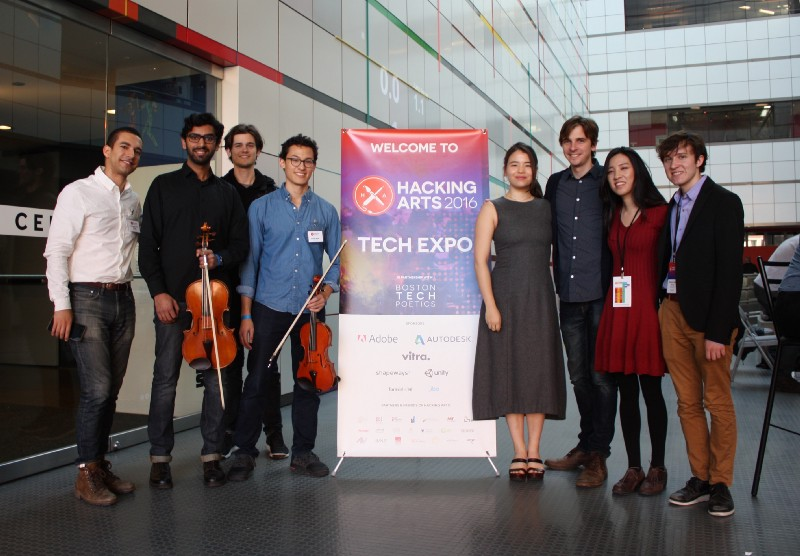By Jason Tseng on April 12th, 2017
Up Close with Arts Entrepreneurs: Hire Notes
Arts | Arts Business | Artsentreawards | Tech
Interview with Founder & CEO, Shaheen Lavie-Rouse
Earlier this year, Hire Notes — a booking platform for musicians that helps them manage their paid gigs , seamlessly get paid on time, and find new bookings— was selected as an honoree for the 2017 Arts Entrepreneurship Awards. We sat down with Hire Notes, CEO and Founder, to talk about how a music conservatory student founds their own technology start up.
[embed]https://blog.fracturedatlas.org/announcing-the-2017-arts-entrepreneurship-awards-honorees-4941cf47bc36[/embed]

First off, How does a cellist in a music conservatory learn to code?
Great question, I get it a lot! There’s a lot of curiosity surrounding who can code and why and how to learn it. I personally believe anyone out there is capable of learning at least a bit of coding.
Classical musicians tend to be nerdy growing up, and I was no different. In college, I also pursued a degree in quantitative economics in addition to my conservatory degree, and got academic exposure to coding for data analytics and research purposes.
I personally believe anyone out there is capable of learning at least a bit of coding.
Once you can code in any language or for any purpose, picking up another is much easier. While working at a data analytics-related job, when I started thinking about how I’ll go about making Hire Notes, I started picking up web development. The web is full of free tutorials and resources for that.
Mentors, friends, and advisors pointed me in the right direction in the early days and soon enough I started helping teach others in an evening class at General Assembly. Musicians coding isn’t uncommon, nearly everyone who’s helped code at Hire Notes is a performing musician. Alex and Ethan who’ve been closest to the project also have conservatory degrees and code professionally. Michael also helped at the start, he has a computer science degree and plays bass guitar with a touring band.

Where did you get the idea to make Hire Notes?
At a certain point in college you start thinking about what your professional options are and what your life would look like, and you see how your peers and mentors think about the same thing. I was in a dual degree program in music and economics, I had big choices to make and a perspective that most people don’t have.
Musicians are obviously super passionate about music, and audiences and fans can be just as excited, so I was obsessed with performing as a long term choice. But on the other hand, the more I learned about how music works as a career, the more I felt like it’s really falling behind everything else out there in terms of the tools and the environment or ecosystem you have as a musician. Musicians make most of their income and are most excited about performing, but every performance I’ve put together I felt like I had to reinvent the wheel to seek out an opportunity, set everything up, and get paid afterwards, and you can still get stiffed. The more I thought about it and the more I advanced in my career, the more I kept feeling like my true calling is actually to work on the ecosystem and technology that operates the music industry, to make it easier. My greatest hope is that if someone does a similar college program in 5 or 10 years and is thinking about their career, they’ll see their options differently.
https://www.instagram.com/p/BHncrI2BWCF/
What is the biggest problem that musicians have with managing their paid gigs?
A lot of people think that musicians are just generally bad at business, or lack some general sense for it. Working in both music and in the professional services side of business, I’ve found that’s mostly wrong. Sometimes it’s just factually wrong, and sometimes it’s wrong because it’s not a helpful perspective to understand at the problems musicians have with managing their paid performances. Most of our early users are very savvy, in how they use or leverage technology, and in setting up and growing their performances as a business.
The biggest problem they’ve had is that they don’t have the best tools to handle these challenges, and that’s when they find us. Performances are complex. They involve a lot of people, logistics, payments, and art, and that’s why it usually takes months or years to plan them. Even our most savvy users were jerry-rigging tools and systems that were made to handle different problems. When each person or organization jerry rigs technology in their own way, and the industry has to work together as an ecosystem by its nature, the result is the general sense of chaos, stress, and challenge that musicians and organizations feel about managing performances.
What was your biggest hurdle getting the project off the ground?
That’s another great question, haven’t really thought about it that much! With each phase or stage of the project, there’s a new bigger hurdle ahead and I’m usually focused on the next one. Generally, our biggest hurdle is finding early adopters, and now specifically we’re working on getting outside our own circles to more diverse types of musicians or organizations. If anyone reading this has a paid performance coming up or is otherwise involved in paid performance bookings, sign up or get in touch over email. We want to learn more about how we can help you get paid faster and manage more performances.
Where do you see Hire Notes going in the future?
We’re starting our journey helping musicians out with the most practical aspects of managing performances. The more performances Hire Notes facilitates, the more data we have, and once we have enough we’ll be able to help connect the business side of the concert experience to the artistic side. We’ll be using data analytics to help musicians and organizations price performances, plan tours, and collaborate better. We’ll help connect musicians to the right patrons at the right time.
https://www.instagram.com/p/BIyMeTgBWE3/?taken-by=hirenotesmusic
Have you dipped your toes in the venture capital waters? If so, what has that been like?
We haven’t raised any outside capital at this point. We’re trying to hold off as long as possible, but we’re also reaching soon a point where that’ll be necessary to take Hire Notes to the next level. In the meanwhile we’ve won a prize at a pitch competition which has led to meetings and great feedback from the investment community in Boston, Silicon Valley, and soon New York. We’ve learned from these interactions about analogous companies in other industries, ideas for partnerships, and feedback on how we communicate our pitch. If any readers out there have ideas related to fundraising, please write in.
Have there been any unexpected discoveries or learnings while making this app?
Every week, sometimes every day, something unexpected happens. Sometimes it’s a big discovery and other times it could be a user calling for customer support at an odd hour. I think the most important big discovery is a very early decision we made, to make an app that’s first a performance management platform, and only after that a marketplace or job market for musicians.
Everyone wants an easier time finding more work, and musicians are no different. But, booking performances is a complex and painful process today, and making that process simpler and easier is the bigger solution to many of the problems we’re hearing from performers that they face. The underlying economics in music make starting a marketplace from scratch very tricky, and many capable teams have tried and failed. A robust performance management platform and the data that it provides are our critical first step to succeed where others have failed in actually getting musicians more work, and help them work better.
